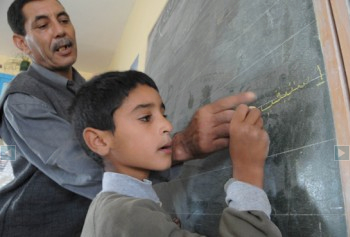Leading UN human rights body puts students before profit
A benchmark UN Human Rights Council resolution has made clear that public education is an essential fabric of society and urges governments that increased investment is needed to guarantee that it remains a public good.

In recognising the “significant importance of investment in public education, to the maximum of available resources,” the resolution adopted during the 32nd session of the UN Human Rights Council (UNHRC) stresses that “education policies and programs are consistent with human rights standards and principles.”
“This resolution reaffirms that public education is the foundation of universal human rights,” said Education International (EI) General Secretary Fred van Leeuwen. “This puts the burden of regulation squarely on the shoulders of governments to make sure that the right to education takes place and that free quality public education comes before a profit motive.”
As the voice of 32.5 million educators around the world, EI welcomes that the resolution reflects the Sustainable Development Goal (SDG) 4 and related Targets which seek to “Ensure inclusive and quality education for all and promote lifelong learning” and that “all girls and boys complete free, equitable and quality primary and secondary education.” This is made evident in the requirement of governments to implement regulation which “strengthens access to appropriate remedies and reparation for victims of violations of the right to education.”
In making quality education the standard bearer for a regulatory framework of education provision, the resolution calls on the need to address any “negative impacts of the commercialisation of education.”
“Quite simply, education regulation must recognise and protect the right to education, thus acknowledging it as a public good,” said EI’s Angelo Gavrielatos.
In calling on states to “hold accountable those whose practices have a negative impact on the enjoyment to the right to education,” the resolution calls for a regulatory framework to be implemented to observe “international human rights obligations.”
“The UNHRC has sent a clear message to the World Bank, the UK’s DFID, profit-seeking edu-businesses and their philanthropic financial backers that as a human right, education must be provided free of charge, putting students before profit,” said Gavrielatos.
With the 47 UNHRC Member States voting unanimously to adopt the resolution, EI calls on all governments to follow their consensus and enact the recommendations.
Source: Education International
- 312 reads
Human Rights
Ringing FOWPAL’s Peace Bell for the World:Nobel Peace Prize Laureates’ Visions and Actions

Protecting the World’s Cultural Diversity for a Sustainable Future

The Peace Bell Resonates at the 27th Eurasian Economic Summit

Declaration of World Day of the Power of Hope Endorsed by People in 158 Nations

Puppet Show I International Friendship Day 2020

